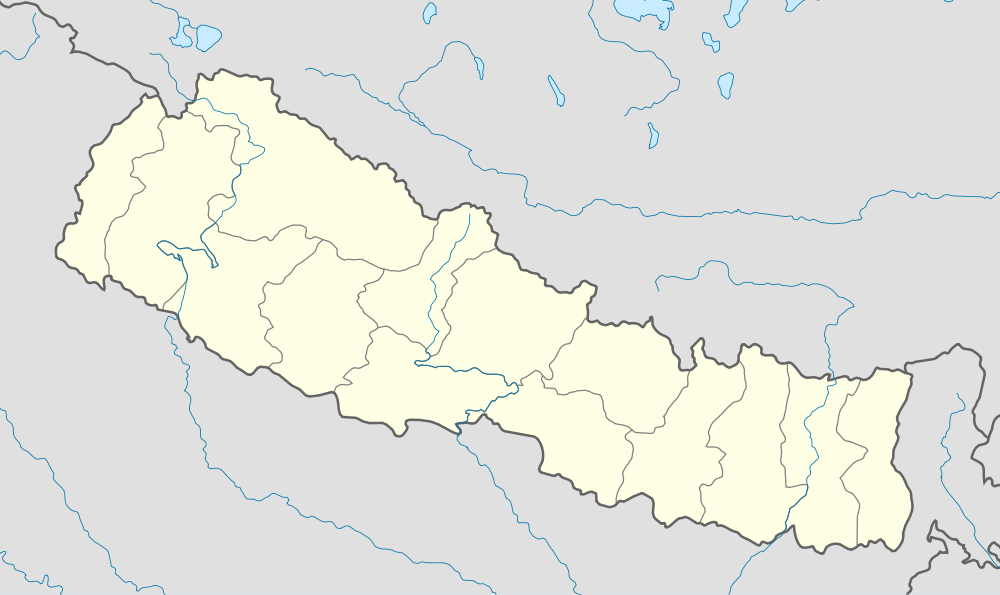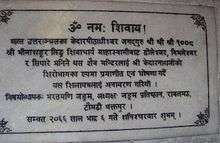Doleshwor Mahadeva Temple
| Doleshwar Mahadev Temple | |
|---|---|
|
A view of Doleshwar Mahadev Temple | |
 Doleshwar Mahadev Temple Location in Nepal | |
| Name | |
| Proper name | Doleshwar Mahadev |
| Devanagari | डोलेश्वर महादेव मन्दिर |
| Geography | |
| Coordinates | 27°38′20″N 85°26′17″E / 27.63889°N 85.43806°ECoordinates: 27°38′20″N 85°26′17″E / 27.63889°N 85.43806°E |
| Country | Nepal |
| District | Bhaktapur |
| Locale | Sipadol VDC |
| Culture | |
| Primary deity | Shiva |
| Important festivals | Shivaratri, Teej, Balachaturdasi |
| Architecture | |
| Architectural styles | Pagoda |
Doleshwor Mahadeva (Nepali: डोलेश्वर महादेव) is a Hindu Temple of Lord Shiva located in the Sipadol VDC, south eastern part of Bhaktapur District, Nepal, and is believed to be the head part of Kedarnath located in Uttarakhand, India.[1][2] [3]
History
For 4000 years people have been searching for the head of (Hindu deity) Kedarnath who assumed the shape of a bull to avoid the five Pandava brothers, the heroes of the Mahabharat. The legend goes back to the fabled battle of Kurukshetra fought between the five Pandava brothers and their cousins, the 100 Kaurava brothers, which is the pivot of the Mahabharata. The Pandavas won, but sorrowed by the loss of lives, they renounced the kingdom they had wrested back and headed for the heavenly abode of the gods, believed to be atop the mighty Himalayan Mountains. The Pandavas reached the Kedarnath region to seek forgiveness from Lord Shiva for the loss of lives during the 18-day Mahabharata war. But Lord Shiva was not ready to forgive them and he took the form of a bull to avoid them. The Pandavas soon realized that the bull was Lord Shiva and tried to stop it by pulling its tail. Suddenly the head got separated from the body of the bull and the Pandavas could not locate it. The hump-backed structure at Uttarakhand’s Kedarnath temple is worshipped as the torso of the holy bull. [4]
Research and findings
The Hindu activist Bharat Jangam had been researching and claiming that Doleshwar Mahadev is the head part of Kedarnath based on the surprising links between Kedarnath and Doleshwor. The Sculptures of Shive found in both shrines are 4,000 years old. Even a stone scripture found in Doleshwor was written in Kannada, an Indian language.The priests in both shrines are selected from Indian’s southern states of Karnataka, Andhra Pradesh, Kerala and Tamil Nadu. Both priests affix the word ‘ling’ after their names to convey their proximity to the god as his worshipper and both temples have a cluster of five Shiva shrines. The main deity of both priests is Birbhadra, a companion of Shiva, according to Hindu scriptures. [5][6]
Recognition
In August 22, 2009 the head priest of Kedarpeeth Shree 1008 Jagat Guru Bheemashankarling Shivacharya unveiled the plaque claiming that Doleswore Mahadev, located in Jangam math Bhaktapur, is the head part of Shri Kedarnath. He performed Rudra Abhishek, a special worshipping at the Doleshwor temple situated in Sipadol village of Bhaktapur district. This is also mentioned in the inscription (Sheela Lekh) at Doleshwar Mahadev. [7] [8] [9] Thousands of devotees have been thronging in the Doleswor Mahadev Temple. [10]

References
- ↑ http://www.doleshwor.org.np
- ↑ http://in.news.yahoo.com/20/20090812/365/twl-mahabharata-era-relic-links-kedarnat.html
- ↑ Prasai, Dirgha Raj. "Hindu shrine: Pashupatinath (Lord Shiva) and Shivaratri in Nepal". The Indian Post. Retrieved 7 July 2012.
- ↑ "4,000-year-old Mahabharata relic found in Nepal? (With Images)". August 12, 2009. Retrieved 25 July 2012.
|first1=missing|last1=in Authors list (help) - ↑ Annapurna Post (7 Bhadra 2066). "Doleshwar Mahadev Kedarnath ko Sheer bhayeko khosana". Bhaktaput. Check date values in:
|date=(help) - ↑ Nepali Samachar patra (22 August 2009). "Aba Doleshwar Hindu ko pramukh dham ". Thimi.
- ↑ Thapa, Bharat Bandu (6 Bhadra). "Mandir Anabaran ". Rajdhani. Bhaktapur. Check date values in:
|date=(help) - ↑ "Doleshwor Mahadev, Sipadol, Bhaktapur, Nepal". Mrrajunepal. Mar 31, 2012. Retrieved 29 July 2012.
- ↑ "Kedharnaat Seer Doleshore Mahadev". Bikram Khatri. May 5, 2012. Retrieved 29 July 2012.
- ↑ "Thousands throng Doleswor Temple". The Himalayan. 2013-08-05. Retrieved 9 Sep 2013.

